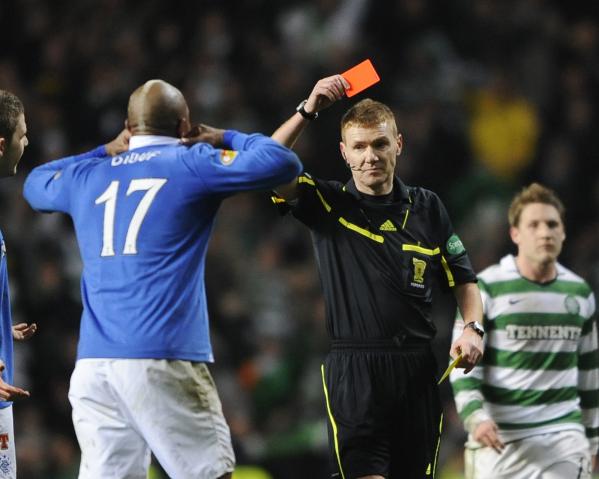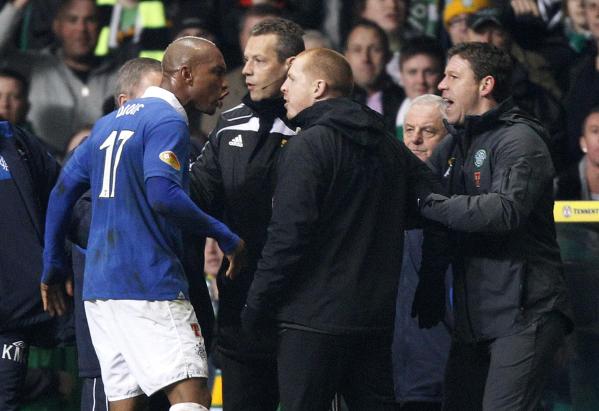To document the challenges that Neil Lennon has faced when it comes to sectarianism during his professional career would require a months worth of articles. However, amid so much controversy with the Scottish game’s governing body in season 2010/11 (Hugh Dallas’ sacking for anti-catholic emails and refereeing cover ups involving Dougie McDonald and his penalty porkies) there were a string of incidents involving bombs and bullets that took place during the latter stages of that same campaign.
As is sadly all too commonplace, Neil Lennon was the first recipient of a package containing bullets. A package was also sent to fellow Irishman, Niall McGinn. The incident took place on 5 January 2011 when staff at the Royal Mail sorting office in Mallusk, County Antrim, alerted police to two suspicious items. The pair had been targeted by bigots in their home province and by the time the news broke on 9 January 2011, a third suspicious parcel was en route to Celtic Park. This time the intended target was Derry man, Paddy McCourt, and the parcel was intercepted at a Glasgow sorting office. The Celtic trio kept a low profile and allowed the police to conduct their investigations.
Two months later, exactly nine years ago to the day, the so called ‘Shame Game’ took place. It was reported by the BBC in the following way:
Controversial match
An ill-tempered Scottish Cup clash between the two sides (Celtic and Rangers) led to political intervention. The match saw three red cards, several touch-line and tunnel confrontations and 34 arrests inside Celtic Park and 187 outside. After the final whistle, Mr Lennon and Rangers assistant manager Ally McCoist were involved in a confrontation.
Strathclyde Police requested a Scottish government-led summit after describing scenes at the game, which Celtic won 1-0, as “shameful.”
Both clubs subsequently agreed to an action plan to tackle Old Firm-related disorder. The fallout from the controversial match continued, however, when the Celtic manager subsequently received a ban for his actions. McCoist had an initial two-match ban overturned, while two of his players, El-Hadji Diouf and Madjid Bougherra, were fined over their actions after the sendings off. This prompted highly-critical comments from Mr McBride towards the SFA. The advocate accused the organisation of being “dysfunctional,” “dishonest” and “biased.”

In response the governing body described the QC’s remarks as “wild” and “inaccurate” and threatened to sue for defamation. The BBC understands there have since been moves by both sides to resolve the matter out of court.
The shame game had seen all three red cards head the Ibrox club’s way, and Ally McCoist act as the provocateur in the post match shenanigans, yet only Lennon was banned. Although, this was the least of the Celtic manager’s worries given what had occurred in January.
It should be the height of scandalous shame when no less than three members of a football club are sent death threats. Disgusting it was then, on Wednesday 20 April 2011, when worse news was to hit the television screens ahead of Celtic’s trip to Kilmarnock that evening. The United Kingdom was left dumbfounded at the harrowing thought that Neil Lennon had been the target of nail bombs “Designed to maim and kill,” alongside prominent Celtic fans (QC Paul McBride and MSP Trish Godman).
The BBC broke the story with a chilling article that appeared on their website. It provides a timeline of the events in the second half of the season, which all fed into this disgusting bigoted attack. The piece read:
“Viable” parcel bombs have been sent to Celtic manager Neil Lennon and two high-profile fans of the Glasgow club, sources have told the BBC. Sources said the liquid-based devices, sent in the past month, appear to have been intended to “kill or maim.”
Mr Lennon’s lawyer, Paul McBride QC, and former deputy presiding officer of the Scottish Parliament, Trish Godman, were the other two people targeted.
The devices were found at various locations in the west of Scotland. Sources close to the investigation indicated they were rudimentary and did not appear to have been made by someone with paramilitary training in bomb-making.
Earlier this week, media organisations, including the BBC, had agreed to a police request not to broadcast details of the bomb incidents while officers carried out inquires.
Scotland’s First Minister Alex Salmond said: “Let us be quite clear – there is a major police investigation under way to ensure that the individual or individuals concerned are identified and apprehended, and then brought to book with the full force of the law. We will not tolerate this sort of criminality in Scotland, and as an indication of the seriousness with which we view these developments the Cabinet sub-committee met last Saturday to ensure that the police investigation has every possible support to come to a successful conclusion.”
The first suspect package was intercepted by the Royal Mail in Kirkintilloch, East Dunbartonshire, on 26 March and was addressed to Mr Lennon at Celtic’s training ground in nearby Lennoxtown. Two days later a device was delivered to Labour politician Ms Godman’s constituency office in Bridge of Weir, Renfrewshire. Her staff were suspicious of the package and contacted Strathclyde Police.
Detectives initially treated the two parcels as “elaborate hoaxes” designed to cause distress rather than serious injury but further analysis has led to them being reclassified as “viable explosive devices.”
The third package was addressed to Mr McBride at the Faculty of Advocates in Edinburgh. It is believed to have been posted in Ayrshire before being found in a letter box by a postal worker on Friday and taken to a Royal Mail sorting office in Kilwinning, where police were contacted.

Shame Game takes place – 2 March 2011
Explosive device
Detectives are also investigating another package addressed to Neil Lennon which was found at a sorting office in Saltcoats, North Ayrshire, on 4 March but this has not been confirmed as an explosive device.
It is understood that specialist anti-terrorist officers are involved in the investigation but a source close to the inquiry said they were “not linking this to any terrorist organisation.”
Henry McDonald, Ireland correspondent for the Guardian newspaper, said that made sense. “I think in terms of the main loyalist terror organisations that are now on ceasefire and say they’ve decommissioned, I think they’d be frankly embarrassed by this kind of thing,” he said.
“They would regard it as a thing of the past and rather as an irritant and an embarrassment to loyalism so I suspect it’s an individual or individuals who maybe had bomb-making experience in the past who are disgruntled and looking for hate figures.”
For the past decade Neil Lennon has been such a figure. The 39-year-old Catholic from Lurgan, County Armagh, has endured threats, abuse and violence. He stopped playing international football for Northern Ireland in 2002 after a death threat, said to be from loyalist paramilitaries. Lennon has also been the victim of a street attack in Glasgow and several other death threats since joining Celtic in 2000.
In January this year bullets addressed to the Celtic manager were intercepted at a sorting office in Glasgow. They appeared to have been sent from an address in Northern Ireland.

Media coverage
The BBC has been told that the three individuals appear to have been targeted after they featured, on separate occasions, in media coverage. Mr McBride is one of the highest-profile QCs in Scotland and a well-known Celtic fan. He has acted for the club and Mr Lennon on several occasions during disputes with the Scottish Football Association (SFA). The advocate has also been highly critical of the SFA in its dealings with Mr Lennon and Celtic.
Ms Godman has a lower public profile than Mr Lennon or Mr McBride but is well known in political circles as an avid Celtic fan. Until dissolution of the Scottish Parliament last month, she was deputy presiding officer and the Labour MSP for West Renfrewshire. On her last day as an MSP she was pictured in the Holyrood chamber wearing a Celtic football top.
Rangers and Celtic meet for the final time this season at Ibrox this weekend in a match which could prove crucial in deciding the Scottish Premier League title. It is understood that senior police officers are concerned about a potential rise in tension ahead of the game on Easter Sunday.
The rivalry between the two Glasgow clubs – known collectively as the Old Firm – is historically tied up in religion. Celtic were formed in 1888 by Irish Catholic immigrants to raise funds to alleviate poverty in the city’s East End. To this day, most Celtic fans come from a Catholic background, while the majority of Rangers fans are Protestants.
Neil Lennon showed immense courage to remain in his role at Celtic and despite reports of the attempt on his life dispersing around the British media, the match against Kilmarnock went ahead at Rugby Park. Lennon’s players responded terrifically, demonstrating extraordinary panache as they strolled to a 4-0 win. There was a touching moment in the 18th minute, when the Celtic fans at both ends of the ground gave a two-minute applause. As a player for the club, Lennon’s squad number was 18 and the gesture was a fitting show of support for him.
The Hoops seemed galvanised by the adversity and followed up their performance at Rugby Park with a strong display at Ibrox, where only a fine save by Allan McGregor prevented Giorgios Samaras’ penalty giving Celtic a 1-0 victory. The Bhoys then thumped Dundee United 4-1 at Celtic Park before disaster struck in the highlands as the Hoops befell a 3-2 defeat against Inverness Caledonian Thistle. The result meant that Celtic surrendered their lead at the top of the table, handing Rangers the initiative in the title race. Nevertheless, Lennon’s team returned to Rugby Park where they earned a comfortable 2-0 victory to stay hot on the heels of their rivals, ahead of a tough midweek trip to Tynecastle on 11 May 2011.
There had been yet more unease in the lead up to the match against Hearts as a group of seven people had been arrested by armed police following a gun alert at Celtic’s Lennoxtown Training Centre. Yet unbowed and unshakable, Neil Lennon and his team stayed focused on achieving the win in Edinburgh and potentially overtaking Rangers, should they offer a chance to erode their one-point advantage.
The match was packed full of drama, beginning when Gary Hooper gave Celtic an early lead in the 12th minute before David Obua, Hearts’ Ugandan midfielder, was red carded on 32 minutes for an innocuous slap aimed at Charlie Mulgrew. Hooper took advantage of the additional space provided by the sending off and doubled Celtic’s lead after the interval with a powerful toe-poke in the 49th minute. Joy turned to despair during the celebrations as attention was turned to a fracas at the Celtic dugout. A Heart’s fan had leapt the advertising board and charged towards Neil Lennon to attack him. The Celtic Manager hadn’t seen his attacker approaching but fortunately his assistant, Alan Thompson, managed to restrain the fan as he was about to strike the Irishman. A police officer quickly moved in and ejected the pitch invader from the stadium. The unseemly scene was described by Barry Anderson of The Scotsman newspaper in the following way:
After refereeing cover-ups, conspiracy theories and parliamentary summits to discuss Old Firm matches, season 2010/11 added another chapter to its book of infamy last night. In the 49th minute of play, Celtic’s celebrations following Gary Hooper’s second goal were cut short. A man leapt from Tynecastle’s main stand to sprint down the track and assault Lennon. The surprised Celtic manager barely had time to react before stewards pounced on his assailant, but that did not stop Lennon swinging his boot at the flattened thug several times. In fact, twice he mistakenly connected with one of the grounded stewards as his rage took over.
Few could blame him given the letter bombs, death threats, 24-hour security and everything else he has tolerated of late. No-one should be subjected to physical abuse for simply doing their job, especially when that job is managing a football team. Where was his protection? Lennon hurled a few expletives at his attacker as he was marched down the tunnel by police and the Irishman was later described as “shaken but fine” by his assistant, Johann Mjallby.
Incidentally this was not the first time that a red-headed Irish Catholic had been attacked by supporters at Tynecastle. Indeed, the Cork born Celtic goalkeeper, James Foley, was set upon by several Hearts fans during a reserve match on 28 November 1936! Under intense provocation, Foley drop-kicked a ball, point-blank, towards the Hearts fans behind the goal. His actions prompted a pitch invasion, in which Foley was head-butted, then arrested and charged with assault. At the trial in Edinburgh on 1 February 1937, left back, Jack Doyle, and left half, Bertie Duffy, both denied that the ball had hit a spectator. Instead, Foley’s teammates testified that it had hit the surrounding wall. Nevertheless, Foley was fined £2 with the option of 20 days imprisonment should he refuse to make payment. Foley, who was by then playing for Portsmouth, had to return to Scotland for this trial and paid the fine.
Jumping back to the case of Neil Lennon at Tynecastle in 2011, the manager sharply switched his focus back to the football. Kris Commons netted a neat curling finish in the closing stages of the match. Though the Englishman strolled into the crowd to celebrate, oblivious to the fact that he had already been booked and was thus ordered off for a second bookable offence. It was a foolish action, which topped off a dreadful day in Scottish football.
The Celtic team had just one more fixture to fulfil, in the hope that they could yet become champions. The squad could have been forgiven for wanting the season to end after the Hearts match, especially when another package containing bullets was found at Celtic Park at 10.30am the following morning. The matter was becoming horrendous, both for the club and for Neil Lennon himself. Regardless, the club was united in trying to get the job done, which they set about doing with a 4-0 demolition of Motherwell inside a raucous Celtic Park. Be that as it may, their efforts were in vein as Rangers won 5-1 at Rugby Park to snatch the league championship by a solitary point. The Hoops did take some consolation from winning the Scottish Cup a week later, with a fine 3-0 victory over Motherwell. By this time, t-shirts bearing the words that Neil Lennon had uttered to his fans on the Parkhead pitch a week earlier, had already covered the terraces: “This isn’t the end, this is just the beginning.” How right he was as season 2011/12 saw Celtic win the first of what is, at the time of writing, eight league titles in a row.
As for the offenders outlined throughout this chapter, Paul Wilson (the Hearts fan who attempted to assault Lennon in the dugout) was sent to prison for eight months for breach of the peace, whilst he was found unproven when it came to the accusation that his motive had been sectarian in nature. Meanwhile, Trevor Muirhead and Neil McKenzie were jailed for conspiring to assault Lennon, former MSP Trish Godman and the late QC Paul McBride, as well as staff at the Irish Republican organisation, Cairde na hÉireann, by sending devices they believed were capable of exploding and causing severe injury. McKenzie was also sentenced to 18 months for a separate charge of posting a hoax bomb to Lennon at Celtic Park, which ran concurrently with his five-year sentence.
The following timeline of offences were read out in the courtroom:
‘A device sent to Lennon at Celtic’s training ground in Lennoxtown, East Dunbartonshire, was intercepted at a sorting office in Kirkintilloch on 26 March last year when a postman spotted a nail protruding from it. It tested positive for peroxide, which can be used to make explosives. Two days later a package delivered to Godman’s constituency office in Bridge of Weir, Renfrewshire, caused the evacuation of the building. Liquid inside a plastic bottle within the package tested positive for a small amount of the primary explosive triacetone triperoxide. Before the incident, Godman, who was Labour MSP for West Renfrewshire, had been filmed wearing a Celtic strip to the Scottish Parliament, which she claimed was meant to be a private matter. Also, on 28 March, a postman tried to deliver a package to Cairde na hÉireann in Glasgow’s Gallowgate. After two failed attempts, it was sent to the Royal Mail’s national returns centre in Belfast, where it was found to contain potentially explosive peroxide. The final package, found on 15 April in a postbox on Montgomerie Terrace, Kilwinning, was addressed to the late McBride.’
Both men were originally accused of a more serious charge of conspiring to murder their targets, but it was thrown out a day before the trial concluded due to insufficient evidence. Muirhead was then ultimately cleared of the charge with a not proven verdict.
Help raise money for Celtic Youth Development by joining the £1 weekly lottery and you could win up to £25,000 – just click on the photograph below to join. Lots of our readers have already done so and they’re now doing their bit to help fund Celtic Youth Development that can deliver the stars of tomorrow and beyond. And you might even win a few bob too! And a special thank you to all The Celtic Star readers who have already signed up and are now supporting youth development to give us the Celtic Stars of the future…

Source link



